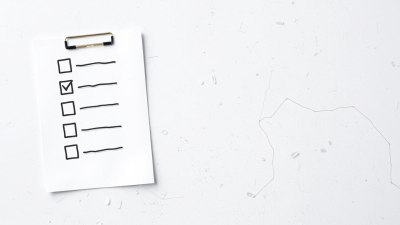From Checklists to Consciousness
Exploring the evolution from mundane checklists to elevated consciousness in daily life and productivity.

Image created with Flux Schnell
In our fast-paced world, the transition from using simple checklists to cultivating consciousness is an essential evolution. Checklists represent a systematic approach to tasks that ensure efficiency and productivity. However, the rise of mindfulness and consciousness practices urges individuals to move beyond mere ticking off items on a list. This article examines the journey from simplistic organizational tools to profound self-awareness, emphasizing the importance of integrating consciousness into daily life.
The Role of Checklists in Daily Life
Checklists serve numerous purposes, from personal task management to complex project coordination. They provide structure and clear direction, allowing individuals to visualize and prioritize their responsibilities. In professional environments, checklists can significantly increase productivity, ensuring no critical steps are missed during high-stakes operations, such as in aviation or healthcare.
In personal life, checklists help streamline activities such as grocery shopping or packing for a trip. They cater to our cognitive need for order, reducing the overwhelm that often accompanies busy lifestyles. However, excessive reliance on checklists can lead to a robotic approach to life, where individuals might become mere automatons completing tasks without genuine engagement.
The Shift Towards Consciousness
As society evolves, there is a notable shift towards consciousness and mindfulness. The concept of consciousness encompasses self-awareness, intentionality, and a deeper connection with oneself and the world. Mindfulness encourages individuals to be present, ground themselves in the moment, and create meaning beyond tasks.
The transition from checklists to consciousness involves recognizing the limitations of a purely checklist-driven approach. While checklists are beneficial for managing duties, they may detract from the richness of experiences if used as the sole metric of achievement. By cultivating consciousness, individuals can elevate their existence and gain a profound understanding of their motivations, feelings, and the impact of their actions.
Integrating Mindfulness into Daily Routines
To foster a conscious lifestyle, integrating mindfulness practices into daily routines can be transformative. Here are some practical strategies:
- Mindful Mornings: Start each day with a few minutes of reflection. Focus on your breath and set intentions for the day.
- Transforming Checklists: Instead of traditional lists, create intention-based lists that prioritize well-being and productivity. For example, rather than a list of tasks, consider what experiences you wish to have.
- Gratitude Journaling: Spend a few minutes each night jotting down what you are grateful for. This practice cultivates appreciation and shifts focus from tasks to meaningful moments.
- Meditative Breaks: Incorporate short meditative breaks throughout the day. Taking a few deep breaths or practicing mindfulness can help rejuvenate the mind and restore focus.
The Benefits of Conscious Living
Adopting a conscious way of living offers numerous benefits, impacting mental, emotional, and physical well-being. Here are some of the notable advantages:
- Increased Emotional Intelligence: Conscious living fosters greater emotional awareness, enabling individuals to navigate their feelings and those of others with empathy and understanding.
- Enhanced Creativity: By stepping away from relentless task completion, individuals can tap into their creativity. A conscious approach encourages exploration and innovation.
- Stronger Relationships: Fostering consciousness allows for deeper connections with others. When individuals are present and engaged, relationships flourish and build trust.
- Improved Well-being: Mindfulness and consciousness practices correlate positively with reduced stress, anxiety, and depression. Engaging meaningfully with life enhances overall happiness.
Challenges on the Path to Consciousness
Cultivating patience and commitment to consciousness is essential. It’s crucial to recognize that this path is not a linear progression. Individuals may experience setbacks and fluctuations in their mindfulness journey. Acknowledging these moments with self-compassion is vital for developing resilience and maintaining a conscious lifestyle.
Incorporating Technology Mindfully
In an age dominated by technology, striking a balance between efficiency and mindfulness is crucial. While technological tools can enhance productivity, they can also lead to distraction and disengagement. The key lies in choosing mindful consumption of technology:
- Mindful Usage: Establish boundaries for technology use. Allocate specific times for checking emails or scrolling through social media to minimize distractions.
- Digital Detox: Designate regular intervals for technology-free time. Engaging in this practice can foster connection with oneself and nature, deepening the conscious experience.
- Intentional App Choices: Select applications that promote mindfulness, such as meditation apps or planners that encourage reflection rather than mindless task completion.
A Conscious Community: Sharing Practices
As individuals embark on their journeys towards consciousness, building supportive communities can enhance personal growth. Sharing practices, challenges, and insights with others fosters accountability and motivation.
Group meditation sessions, mindfulness workshops, and conscious living discussions can create a sense of belonging among like-minded individuals. Communities can offer support and encouragement while navigating challenges associated with moving towards a more conscious lifestyle.
The Future of Conscious Living
As awareness of the importance of consciousness grows, so does the potential for transformation in various aspects of life. Educational institutions, workplaces, and communities are beginning to recognize the need for integrating mindfulness practices into their frameworks.
The future of conscious living holds the promise of fostering healthier relationships, improved mental health, and a more profound connection with the world. Transitioning from checklists to conscious practices is not just an individual journey; it is a collective movement towards a more intentional and empathetic society.
The migration from checklists to consciousness is a vital process in today’s world. While checklists serve a purpose in organizing life, they should not define our experiences. Embracing consciousness creates pathways for meaningful connections, enhanced well-being, and a richer understanding of self and surroundings. By integrating mindfulness into daily routines, individuals can cultivate a more profound existence that transcends mere task completion, ultimately leading to a holistic approach to living.











